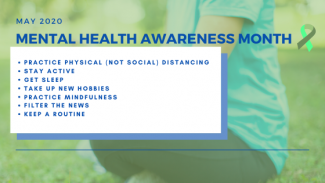Protect Your Mental Health During COVID-19
May is Mental Health Awareness Month, and now more than ever, District residents are looking for ways to support their mental health during the coronavirus (COVID-19) pandemic. It’s easy to feel overwhelmed and worried when there is a constant stream of stressful news, sickness and loss, isolation from friends and family, financial hardship, and other daily triggers—but there are simple, practical steps you can take to help you during this health crisis.
Protect and care for your mental health during COVID-19 by:
Practicing physical (not social) distancing
Stay in touch with your loved ones. Checking-in via phone, video, or social media can help everyone feel connected despite the distance. Some people are using this time to re-connect with friends they have lost touch with too.Staying active
Research suggests that when we exercise, our brain releases chemicals that help us better manage stress and anxiety. Moving your body is a powerful way to improve both your physical and mental health.Getting sleep
Our bodies and our minds can feel like they are operating in “overdrive” during this crisis. Make sure to get plenty of rest to be able to face tomorrow’s challenges. The Centers for Disease Control recommends that adults get at least 7 hours per night. Cutting off screen time 30 minutes to an hour before bed can help you better fall asleep.Taking up new hobbies
Do meaningful activities with your free time including reading books, writing in a journal, gardening, painting – whatever brings you joy and helps clear your mind. Remember to create some separation from work, so that you have time to do the things you enjoy.Practicing mindfulness
When faced with uncertainty, it is easy to begin worrying about the future. Meditation or simple breathing exercises can help you relax in the present moment.Filtering the news
Watching the news for long periods of time can increase stress. Be selective in your news consumption and set a limit on how long you will watch the news.Keeping a routine
Following a daily routine can help give you a sense of normalcy. Go to bed and wake up around the same time. Get ready in the morning and schedule time for activities as you normally would (e.g. exercising, eating, participating in clubs). Now more than ever, it’s important to maintain a healthy work-life balance.
Help for District Residents
Remember that you are not alone during this challenging and stressful time. OAG is here to help, hear your concerns, answer your questions, and investigate your complaints. Please reach out to our office and get the latest COVID-19 updates, including tools and resources, at: www.oag.dc.gov/coronavirus.
Protecting Domestic Violence Survivors from Abusers (Civil Protection Orders)
If you are in immediate danger, call or text 911. Residents can file a petition for a Civil Protection Order (CPO) by calling the D.C. SAFE Response Line at 1-800-407-5048 to have an advocate help them through the process. Alternatively, residents can electronically file themselves through the D.C. Superior Court at: https://www.probono.net/dccourts/. Currently, all CPO cases are being scheduled for a date after May 15, 2020, but petitioners can request a Temporary Protection Order (TPO) when filing to protect them until their CPO court date. TPOs that were issued for two weeks and were to expire in March will not expire until May 15th or the next assigned court date.
For those who have a CPO or TPO and the respondent is violating the order, call or text 911 if you are in immediate danger or call the D.C. SAFE Response Line at 1-800-407-5048 for assistance in filing a Motion for Criminal Contempt.
Check out OAG's alert with resources for domestic violence survivors who may be at greater risk of harm because they are living with their abuser during COVID-19.
Removing Guns from Dangerous Persons (Extreme Risk Protection Orders)
If you are in immediate danger, call or text 911. Residents can seek an Extreme Risk Protection Orders (ERPO) by filling out this form electronically and then contacting the Court to complete the filing by phone at (202) 879-0157 or by email at domesticviolencemanagement@dcsc.gov. Learn more about ERPOs by reading OAG’s Red Flag Law guide.
OAG works to protect District residents from harm by connecting them to mental health treatment by: 1) appointing a guardian and/or conservator for incapacitated individuals; 2) committing individuals for emergency treatment who are likely to injure themselves or others; and 3) public education about local resources.

